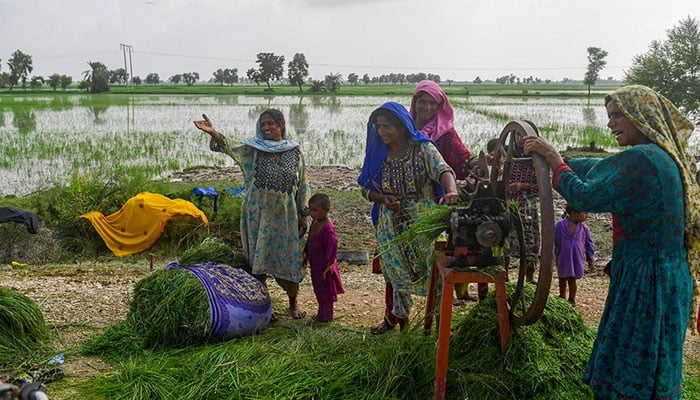Women peasants decry government’s failure to implement minimum wages
Hyderabad: The Sindh government is not interested in the welfare and protection of women peasants and workers because there is no mechanism in the agriculture sector to ensure the provision of Rs32,000 minimum wage.
This was stated by women participants at a seminar organised by the Hari Welfare Association (HWA) on the inauguration of the Women Peasant Literary Centre in Matiari district.
This is one of the 12 literacy centres, the HWA announced for peasant women in Shaheed Benazirabad, Sanghar and Matiari districts of the province.
Speaking at the seminar, HWA President Akram Khaskheli said a significant number of rural women faced challenges in understanding medicine expiry dates as they could not read and write and likewise, they struggled to lodge complaints on online platforms and faced difficulties in reading signboards.
He said many such women also had no understanding of mathematics due to which they could not ensure whether they received the promised wages by the contractors.
He added that one of the reasons for debt bondage was that peasants, who included women, did not know how much loan they had taken from contractors, landlords or brick kiln owners who continued to increase the debt burden on peasants and workers without them realising it.
He said 600 rural peasant women who were also members of the women's trade unions in these districts had been enrolled at the centres where they would be provided basic education and imparted life skills and awareness of social, economic and political rights.
Khaskheli remarked that in the four-month literacy course, the participants would have a context-specific curriculum, including literacy in Sindhi and English, numeracy and essential life skills, under the supervision of female community teachers.
In addition to academic education, the centres would also hold awareness programmes on labour rights and various existing laws for protecting women agricultural workers. He said that by completing the literacy programme, 600 women would be able to read and write basic things important in their profession such as the price of commodities and expiry dates, and they could negotiate wages.
The HWA president added that the programme would engage 500 literacy trainees for income-generating projects through skills development and entrepreneurship trainings, and linkages to relevant market opportunities to make a sustainable contribution to their household income.
Talking at the event, social organiser Yasmeen Tariq said few employment opportunities, unfair wages and lack of facilities at workplace were problems of rural women. She expressed the hope that the literacy programme would overcome the issue of unfair wages and said that childcare and healthcare facilities should be provided to them. Jaamul, one of the enrolled trainees belonging to Sher Khan Malokhani village, said that she would hold the pen for the first time, and this literacy programme would resolve many issues in her life.
-
 Prince William Criticized Over Indirect Epstein Connection
Prince William Criticized Over Indirect Epstein Connection -
 'Finding Her Edge' Creator Explains Likeness Between Show And Jane Austin Novel
'Finding Her Edge' Creator Explains Likeness Between Show And Jane Austin Novel -
 Margot Robbie Delivers Sweet Message Ahead Of Valentine's Day
Margot Robbie Delivers Sweet Message Ahead Of Valentine's Day -
 How AI Boyfriends Are Winning Hearts In China: Details Might Surprise You
How AI Boyfriends Are Winning Hearts In China: Details Might Surprise You -
 Blake Lively Mocked Over 'dragons' After Latest Court Appearance
Blake Lively Mocked Over 'dragons' After Latest Court Appearance -
 Gmail For Android Now Lets Users Create Labels On Mobile
Gmail For Android Now Lets Users Create Labels On Mobile -
 Emma Slater Reveals Final Moments With James Van Der Beek Before His Death
Emma Slater Reveals Final Moments With James Van Der Beek Before His Death -
 Princess Kate Makes Surprise Visit To Support Mental Health Initiative
Princess Kate Makes Surprise Visit To Support Mental Health Initiative -
 Reese Witherspoon Sparks Nostalgia With 'Green Sisters' Tribute To Jennifer Aniston
Reese Witherspoon Sparks Nostalgia With 'Green Sisters' Tribute To Jennifer Aniston -
 Royal Family Faces Fresh Crisis While Andrew's Controversy Refuses To Die
Royal Family Faces Fresh Crisis While Andrew's Controversy Refuses To Die -
 Travis Kelce’s Mom Talks About Taylor Swift’s Wedding Dance Song And Whether She’s Signed An NDA
Travis Kelce’s Mom Talks About Taylor Swift’s Wedding Dance Song And Whether She’s Signed An NDA -
 James Van Der Beek's Final Days 'hard To Watch' For Loved Ones
James Van Der Beek's Final Days 'hard To Watch' For Loved Ones -
 Lewis Hamilton Ditched Question About Kim Kardashian?
Lewis Hamilton Ditched Question About Kim Kardashian? -
 Will Smith, Jada Pinkett's Marriage Crumbling Under Harassment Lawsuit: Deets
Will Smith, Jada Pinkett's Marriage Crumbling Under Harassment Lawsuit: Deets -
 'Fake' Sexual Assault Report Lands Kentucky Teen In Court
'Fake' Sexual Assault Report Lands Kentucky Teen In Court -
 'Vikings' Star Shares James Van Der Beek's Birthday Video After His Death
'Vikings' Star Shares James Van Der Beek's Birthday Video After His Death




